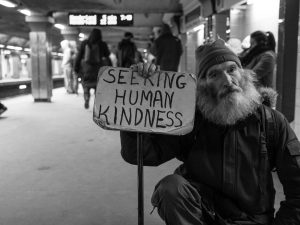Hockey unites Canada.
It’s part of our history, our cultural heritage, and in our nation’s identity. It was hockey that connected me to the tragedy of the Humboldt Broncos hockey team.
When I first read about the accident and discovered that it involved a hockey team from Humboldt, Saskatchewan, I recalled a children’s book that I have read to my son many times: The Hockey Tree. The story is set in Humboldt Lake where Owen, his father, and sister went to play pond hockey. I’ll never read that book as just a story – because it’s a reality for so many Canadians. Playing pond hockey is a common pastime for a lot of us. I imagine it is no different for the players of the Humboldt Broncos.
The Sunday night vigil
All throughout the Saturday after the tragic crash, my sports apps primarily featured information about what happened, the people involved, the community of Humboldt, and the provincial, national, and global response – both those in the world of sports, and those in political office.
Working through the shock and the pain, the amazing volunteers of Humboldt and the surrounding area put together a vigil at the Edgar Peterson Arena, home of the Humboldt Broncos. Pulling this off through the clouds of emotion is one thing – to do so with all the national coverage is amazing. I knew I had to watch Sunday night – not as a spectator, but as a participant.
There were a lot of emotions I was wading through and assortment of thoughts and questions. I had never participated in a vigil; I wasn’t sure exactly what a vigil was for, but I figured it was an opportunity for people to come together in a physical way to start some processing of the tragedy. I was looking for answers, and I was looking for comfort. I don’t think I was the only one watching online with a similar desire.
Pastor Sean Brandow’s response
Mayor Muench was first to speak at the vigil. He wisely acknowledged that coming together for this vigil was an important step towards healing for the community of Humboldt and everyone else directly impacted by the accident. It’s a long road, one that we must walk together.
After a number of other speakers, the main address was given by Pastor Sean Brandow, the Bronco’s team chaplain. His congregation consisted of these young athletes in the prime of their lives. They weren’t supposed to die this young. What would he say at a time like this?
He began by sharing,
“We travelled up and arrived at the scene … and walked upon a scene I never want to see again … To sounds I never want to hear again.”
You can watch his full address.
There were many thoughts and reactions I had to his address, and I want to share two here. These thoughts have helped me understand myself more, and understand how the gospel is at work in my heart and my mind today.
He Wept
As the team chaplain, he had a close relationship to some if not all the players. It was clearly evident as he wept and expressed the deep sadness he felt as a result of the death and critical injuries to those on the bus. Being a Christian does not mean we live a perfect life, free from pain. We are not immune to the emotional impact of death. As the previous speaker reminded us from John 11:35, “Jesus wept” upon news that his close friend Lazarus had died.
Pastor Sean wept because Jesus wept.
He acknowledged the looming questions
Pastor Sean did not hide (or ignore) the two big questions that one might ask at a time like this. “Why God?” and “Where was God?”. He did not attempt to answer the first question, but acknowledged it as a very legitimate question for anyone, regardless of where you stand in your faith.
He did spend time exploring some thoughts to the second question: “Where are you God?” He did not offer these reflections callously as if reading from a seminary textbook, but out of his own journey, one that many Canadians are also on (or might be on one day).
Where is God at a time like this?
“That question has two answers. God is on the throne and God is with the brokenhearted. We know that God is on the throne, Jesus walked this earth, he died, he was buried, he rose again. It says in the scripture that he is now seated at the right hand of the Father, in control of setting up our leaders, putting people in the place where they need to be at just the right time, for just the right purpose, making sure that things line up according to his plan. I don’t claim to understand how this seems like it’s in God’s control at all, but it is. He’s still on the throne, he’s still God.”
Pastor Sean Brandow
He’s still on the throne, he’s still God.
Processing Pastor Sean’s words
I went into the vigil looking for some semblance of hope, words of comfort – for myself, but also for those of Humboldt. I wondered to myself, “What are the people thinking and feeling as they listen to Pastor Sean?” “How do I feel as listen?”
As a Christian, I experienced an apparent disconnect between what I had given myself permission to feel – and what I thought I should feel. Even though I agreed fully with what Pastor Sean said, in the moment I didn’t feel any better, or comforted. The pain and the grief felt too overwhelming, too looming. Why weren’t my emotions changing immediately like swiping down on my phone to refresh my sports scoreboard?
For a few minutes, I considered that Pastor Sean shouldn’t have been speaking because his words weren’t generating an instantaneous feeling of comfort. I then asked myself: Then who? And what would they say? Who would wax eloquent in a time like this?
Words of hope pointing to an empty tomb
What words can be said that can offer any notion of hope? And on what basis can one offer hope (or communicate there is hope)? Certainly hearing from someone that has gone through hopelessness can bring a notion of hope. Even more so, just being present is a powerful way to communicate hope and bring comfort.
And that is what Pastor Sean communicated that Sunday night to me, and countless Canadians.
Pastor Sean’s words explained how there was a point in history, when God took on human likeness in Jesus to be present among the broken-hearted. Sean’s words and expression of sorrow acknowledged that Jesus himself felt as we feel. Sean’s words reminded some and explained to others that there does exist hope in the midst of death because death doesn’t have the final say. Death is not the end of the story.
When Jesus died on the cross, he didn’t stay dead. His tomb was empty 3 days later. God the Son rose from death to live eternally with God the Father. Sean did not muster up his own words to bring hope, but pointed to a historical event that changed the world and can allow us to make sense of the world we find ourselves in today.
Pastor Sean leaned into the power of the gospel to give him hope and invited those listening to do the same. As for myself, my own heart echoes the words Pastor Sean stated for Humboldt, “Oh we need Jesus. We need to hear from God.”
"*" indicates required fields
Share this!
About the Author





